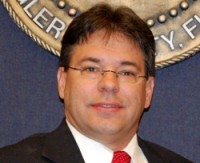
Every year, the Flagler County Tourist Development Council, an arm of county government, awards $100,000 in grants, or subsidies, to organizations that put on special events and bring overnight visitors to the county or enhance Flagler’s “quality of life.” The subsidy is justified as an investment: in exchange for public dollars, the organizations pledge to book so many hotel stays that then generate the 4 percent bed-tax dollars that end up flowing back to the county’s coffers. Overnight visitors also spend more money in local restaurants and retail outlets, spurring business activity.
Organizations that get the money are required to spend it on advertising or promoting their event in Flagler County.
Wednesday, council members—most of them, anyway—agreed to move toward significantly changing the way the money is awarded and how it may be spent. The change, once resisted by the council’s former chairman–Milissa Holland–appears to be prompted by the county administration and newly installed Council Chairman Nate McLaughlin, who is also the current chairman of the county commission.
Palm Coast’s managing of special events is a model, if not a competitor: Palm Coast has been relatively successful in recruiting certain events to town, especially soccer, lacrosse, tennis and running tournaments, all of which yield waves of visitors. The county is playing a significant part in fostering such events through a countywide sports alliance, but it’s been under pressure to make tourism dollars more easily accessible by eliminating some of the strings currently attached to the money. But there may be questions over the legality of the changes sought, and whether the council could apply its rule changes retroactively.
“Who we’re going after to help is the organizers,” Georgia Turner, the county’s tourism director (and a key mover behind the sports alliance), said.
Council members have directed their staff to create a sliding scale that would more strictly regulate some of the grants in exchange for overnight stays. The grants are broken down into four categories: organizations that project 200 or more hotel room bookings get a $10,000 subsidy (payable after they prove they’ve filled the rooms). Those who fill 100 to 200 beds get $7,500, and so on down to the smallest category of $2,500 for 10 to 49 rooms.
Initially, some members wanted a sliding scale applied only to the smallest category, to close a perceived loophole that might allow an organization to promise 49 bookings but produce only 10. In the end, the sliding-scale idea was adopted for all four categories, essentially eliminating the brackets in favor of more complicated calculations that have yet to be pinned down.
Two council members—Bob DeVore and Bill McGuire, who represents the Palm Coast City Council—find the changes unnecessary. “If it ain’t broke, don’t fix it,” McGuire said, at one point cautioning that he would not vote for a resolution to that effect. DeVore doesn’t want to diminish the program’s ability to serve as a seed for new events that could grow with time. Nothing under current rules, he said, stops the council from rejecting an organization should it prove disappointing, when it applies for money a second time.

How organizations may spend their subsidy awards would be an equally significant rule change. Currently, “One hundred percent of the funds awarded to overnight stay special event grant recipients shall be used for advertising and promotion to target audiences outside of Flagler County,” the grant application states.
The council is proposing to change that to make a slew of expenses unrelated to marketing eligible for reimbursement, including security costs, sports officials’ fees and housing costs, rental items, transportation costs, clean-up costs, printing costs and “other expenditures consistent with Florida statutes and TDC objectives.”
Various council members were concerned about the specificity of the allowances, and the way organizers might abuse them: it’s easy, several council members said, to fake receipts these days, and to pass off one’s uncle as a janitorial professional who nevertheless might end up getting $500. The council did not address that loophole beyond saying that it would simply examine receipts carefully.
But the issue also revealed the vulnerability the council is willing to take on: Currently, receipts can be checked against provable advertising spending through, say, magazines, websites or television. No such verification would be possible with the looser categories of allowable spending.
Surprisingly, some council members also appeared willing to dispense with the advertising requirement altogether. McLaughlin was willing to reduce to zero the requirement that any of the money be spent on advertising or marketing an event. But that issue was left hanging when McLaughlin was forced to end the workshop just past noon, as council members had left the meeting one after the other to the point of robbing McLaughlin of the quorum he needed to go on.
The council will take up the issues with more concrete proposals presumably at its February meeting. Before taking effect, each proposal will have to be approved first by a majority of the council, then by a majority of the county commission.





























Complex says
Ah yes Tourism. Palm Coast loves to make money off of it so much so they decided to put a red-light camera at Belle Terre and Pine Lakes Parkway. There hasn’t been an accident there since they changed the traffic lights. So city of Palm Coast.. you can’t tell me that red-light camera was put there for our safety. You put it there strictly to make $$$ off the people coming in for the various games held at the complex.
And Palm Coast Parkway is just a joke for red-light cameras. The entire road from east side of 95 almost to US1 has one at almost every intersection. Cha-ching.. cha-ching. I swear I feel like at every light I have to have my foot hovering over the break pedal.
Palm Coast is like a city block compared to Orlando.. but in terms of red-light cameras were catching up really quick.
Make your citizens happy and take some down!
Sorry to get off topic, but this city is all about making a buck off whatever they can.
tulip says
While it’s possible some changes may need to be made, this isn’t the way to do it, as it does open the possibilities of fraud and favoritism. McLaughlin appears to have his own personal agenda, and it seems that he has taken a monopoly on the major committees, including the one Barbara Revels had the total experience to keep.
I’m glad some members walked out leaving McLaughlin without a quorum.
Susan says
WHY would anyone want to come here to Palm Coast ? Go to St. Augustine or Jacksonville. Maybe Daytona Beach (then again maybe not). This place has become the ARMPIT of FLORIDA ! Get out while you can.